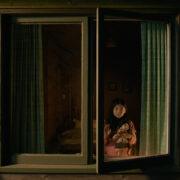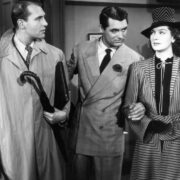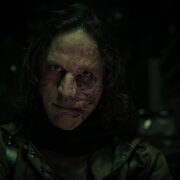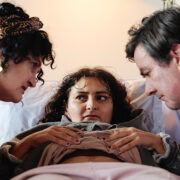BLACK BAG: Steven Soderbergh’s Elegant Thriller Is A Spy Caper Made For Adults
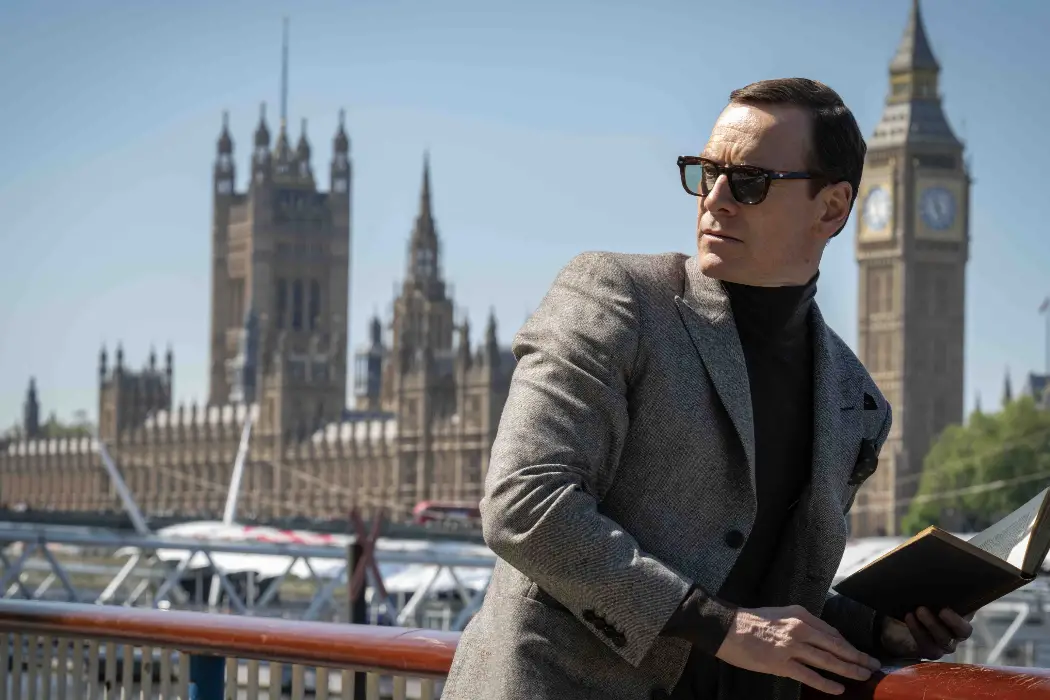
Film critic, Ithaca College and University of St Andrews graduate,…
At our most cynical moments, we can reduce most films in our minds to gorgeous people reading smart lines in luxurious rooms. Black Bag is director Steven Soderbergh’s latest, a tight little picture that, depending on your mood, can be either an empty exercise in style and genre or a vibrant and intelligent chamber drama. As with many of Soderbergh’s films, the cinematic technique is excellent — you’d be hard-pressed to find a more reliable cinematic craftsperson working today. His films tell their stories economically and without great labor, and his boundless creativity and dedication to working with talented people and small budgets means that his work is consistently interesting if not always sensational.
The film is a classic example of that now-tired description: “the kind of film they don’t make anymore.” It’s an adult spy drama, the kind where there’s exactly one explosion and one gunshot and the two big set pieces involve six characters talking around a dinner table. Unsurprisingly, this is the work of David Koepp, who is the foremost architect of modern Hollywood spectacle (he wrote Jurassic Park, its sequel, and Spider-Man) as well as a genuinely talented, interesting writer whose best recent work has been in collaboration with Soderbergh. (He wrote and produced Kimi, Presence, and now Black Bag.) As a result, the script moves briskly and knows how to generate old-school thrills and suspense without the usual spy film tropes of assassins in the shadows, rainy European nights, and precisely choreographed fight sequences. James Bond, this is not. Black Bag is a return to form for the spy genre, a work that reminds you that sometimes, genre movies can be made for actual adults.
A Classy, Elegant, And Sharp Spy Thriller
Black Bag follows George Woodhouse (Michael Fassbender), a British spy searching for a mole within his organization. The mission is top-secret, requiring him to use his own powers of deduction and reasoning to sniff out the traitor — the catch is, one of his suspects is his own wife, Kathryn St. Jean (Cate Blanchett), who is herself a decorated and highly respected and feared field operative. Also on George’s list of suspects are the boisterous agent Freddie (Tom Burke); the clever satellite imaging specialist Clarissa (Marisa Abela); the debonair agent James (Regé-Jean Page); and the agency’s psychiatrist, Dr. Zoe Vaughan (Naomie Harris). Rumor is, this somebody leaked a highly classified and very dangerous program called Severus — one of those “might start World War III” sort of deals — so George’s task is of the utmost seriousness.
The premise doesn’t exactly make your head spin, but the execution does. Koepp’s script is mostly tense, double-edged conversations and ulterior motives, each scene a new opportunity to test allegiances and sniff out a rat. The plot might be far from nuanced, but it plays out like an old spy novel from Ian Fleming or John le Carré — that is, a serious spy novel before Hollywood gets its hands on it and crams the story full of car chases, shootouts, and sex scenes. The script is unfalteringly mature and yet still moves at a satisfying flutter, turning surveillance scenes and fishing trips into edge-of-your-seat suspenseful set pieces.
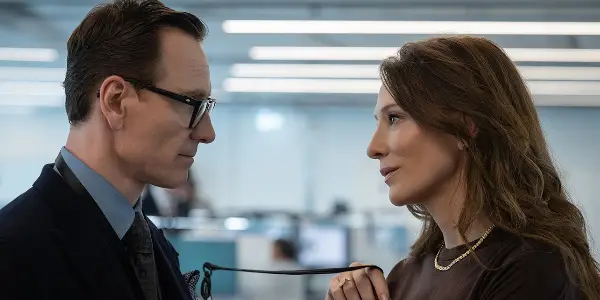
The film’s main hook is how it examines George and Kathryn’s work through the perspective of a long, successful marriage. Most spy films deal with lecherous sexmongers (James Bond) or asexual killing machines (Jason Bourne), so it’s refreshing to see a healthy marriage at the core of Black Bag. Soderbergh and Koepp explore how surveillance work changes the ideas of truth and trust in a relationship — as one character says, drunkenly, over dinner, “When half your life’s in a black bag, how’s little civilian wife here ever to have a prayer of knowing where you’re sticking it?”
The notion of a “black bag” recurs throughout here as a catch-all term for spycraft — the kind of business you need a certain security clearance to know. While it’s an invention of Koepp’s (and a pretty bad title for a film), it also functions as a sort of philosophical metaphor for the deep, dark secrets we all try to keep out of our personal affairs, akin to the idiom of the “emotional baggage” one carries to a relationship. Of course, it helps that it sounds like spy lingo, like how le Carré invented so many modern spy terms, including “honey pots” and “moles.” The film might be dealing with modern technology and modern geopolitics, but its vibe is very throwback.
Immaculate Costume Design
Beneath Soderbergh’s crisp digital cinematography and cool color tones is the same sort of classy, elegant spy story that the U.S. and the U.K. have been telling for generations. But where Black Bag innovates in that regard is in how it presents its central spy couple.
The real auteurs of Black Bag are the costume designers. Costumers Sarah Bosshard and Ellen Mirojnick (the latter of whom also worked on Oppenheimer and Bridgerton) successfully give the modern spy a redesign. They resist the temptation to dress these people in the same boring Saville Row suits, instead finding believable and suave styles to suit each character. Take George for example — he is a traditional man who loves fishing and cooking, but he also has a deep-seated intensity and devotion to his work and his marriage. He’s usually dressed in turtlenecks and blazers or smart button-up shirts while nearly all the men around him at the organization wear three-piece suits, reflecting his role as an arbiter and investigator who’s on his own mission.

George’s thick black-framed glasses perfectly complete the ensemble. They almost put us at ease, since most of the characters we see doing jiu-jitsu in spy films don’t wear glasses, but they reinforce the character’s intelligence and wit; they also complement his multifaceted interests, as in a lovingly framed closeup, we watch them cloud with steam as he cooks. They immediately call to mind the character George Smiley and, for die-hard spy film fanatics, Harry Palmer, played by Michael Caine in five films throughout the 1960s and ’90s. In a brisk film that’s as economical as possible when it comes to character development, the wardrobes of these characters manage to speak volumes about them.
It’s Handsome, But What’s The Point?
Black Bag has no shortage of admirers, and I understand where they’re coming from — the film is well-made, it’s short, and it feels like it’s made for adults. Many have compared its central romance to The Thin Man, and indeed Koepp had been working on a remake of The Thin Man back in 2011, then supposed to star Johnny Depp and be directed by Rob Marshall. And while that may have very well been the starting point for Black Bag, in my estimation, Fassbender and Blanchett lack the genuine emotional connection, humor, and easy wit of William Powell and Myrna Loy. That general lack of feeling extends throughout the picture — perhaps more than most modern spy films, Black Bag leaves you impressed but cold, and I found myself unable to connect in a meaningful way with its characters or story.
Speaking of story, aside from the marriage-is-spycraft-is-marriage theme, Koepp’s other big mission here seems to be to underline the professionalism and complexity of modern surveillance and espionage. The story’s main driving force is Severus, a program that could cause a cataclysmic nuclear meltdown in Russia. “It could end the war!” one of the characters declares, one of only a few moments that reminds you the film is supposed to be set in the real world. Yet the characters of Black Bag, besides the traitor, don’t seem to have any sort of ideology whatsoever — at least, none that prevents them from surveilling suspected terrorists, ordering drone strikes and then still being able to sleep at night. Black Bag does not pass any critical judgment on the unopinionated characters who work tirelessly within the intelligence service and does ask us to condemn the sole person in the plot trying, in some cockamamie way, to save innocent lives in Ukraine. But more than that, the sheer complexity of the plotting will keep most viewers from being able to suss out what the movie’s actual political leanings are, if they’re even identifiable at all.
In that way, I wish Soderbergh were a braver filmmaker. He’s long been an ideological force in the American film industry, whether he’s making a barnstormer anti-capitalist legal drama like Erin Brockovich or an incendiary biopic like Che. But Black Bag feels like the sort of film made by a filmmaker who made a Che Guevara biopic 20 years ago and was so overwhelmed by it that they’ve never tried to make anything nearly as revolutionary or overtly political since.
Conclusion
Soderbergh is no stranger to films starring handsome people saying clever lines wearing beautiful clothing. He made three Ocean’s films, after all. Scene to scene, Black Bag is ravishing in its economy of storytelling, impressive in its performances and writing, and refreshing in its adult approach to the spy genre. And the costuming and art direction are nothing short of spectacular — it’s truly awe-inspiring work that deserves recognition. But on a macro scale, it feels a bit like diminishing returns from the Ocean’s films, achieving that same slick style but unable to innovate when it comes to a thoroughly chronicled genre.
Black Bag is currently showing in cinemas and is available to rent online.
Does content like this matter to you?
Become a Member and support film journalism. Unlock access to all of Film Inquiry`s great articles. Join a community of like-minded readers who are passionate about cinema - get access to our private members Network, give back to independent filmmakers, and more.
Film critic, Ithaca College and University of St Andrews graduate, head of the "Paddington 2" fan club.






